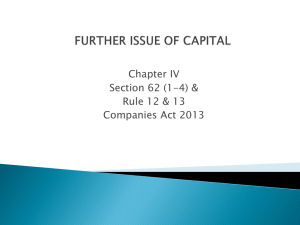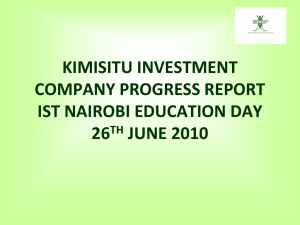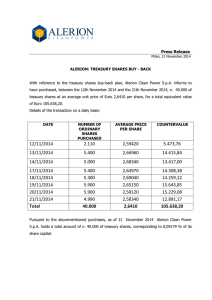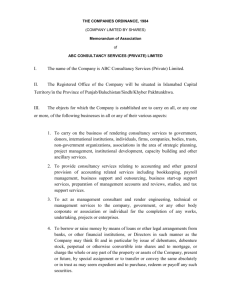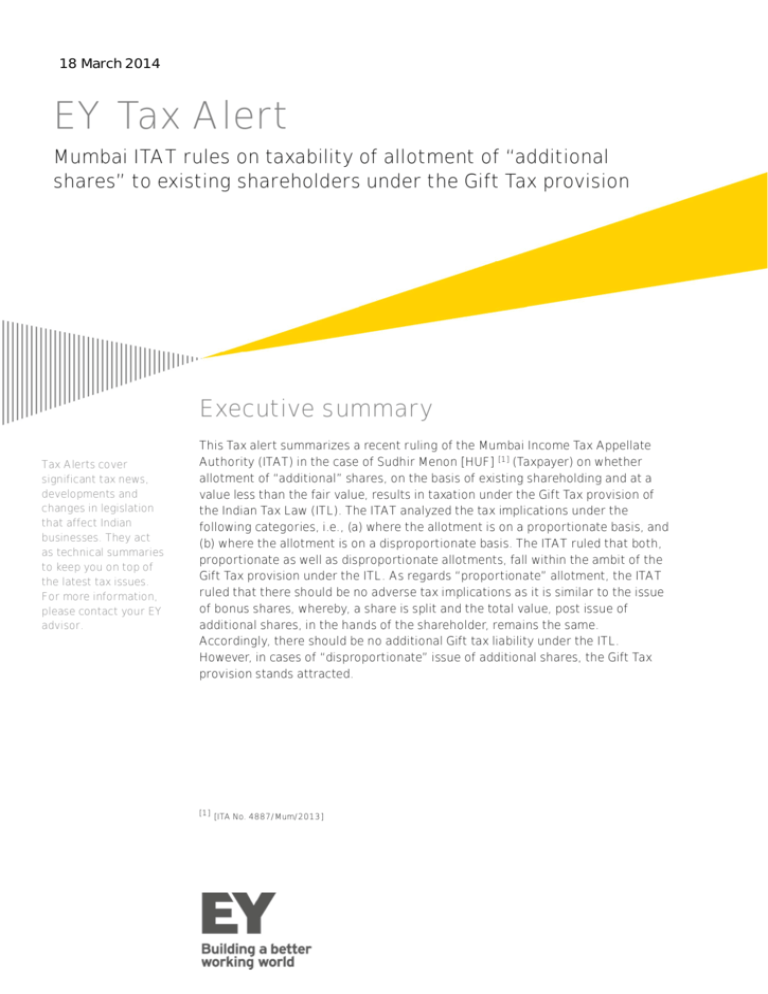
18 March 2014
EY Tax Alert
Mumbai ITAT rules on taxability of allotment of “additional
shares” to existing shareholders under the Gift Tax provision
Executive summary
Tax Alerts cover
significant tax news,
developments and
changes in legislation
that affect Indian
businesses. They act
as technical summaries
to keep you on top of
the latest tax issues.
For more information,
please contact your EY
advisor.
This Tax alert summarizes a recent ruling of the Mumbai Income Tax Appellate
Authority (ITAT) in the case of Sudhir Menon [HUF] [1] (Taxpayer) on whether
allotment of “additional” shares, on the basis of existing shareholding and at a
value less than the fair value, results in taxation under the Gift Tax provision of
the Indian Tax Law (ITL). The ITAT analyzed the tax implications under the
following categories, i.e., (a) where the allotment is on a proportionate basis, and
(b) where the allotment is on a disproportionate basis. The ITAT ruled that both,
proportionate as well as disproportionate allotments, fall within the ambit of the
Gift Tax provision under the ITL. As regards “proportionate” allotment, the ITAT
ruled that there should be no adverse tax implications as it is similar to the issue
of bonus shares, whereby, a share is split and the total value, post issue of
additional shares, in the hands of the shareholder, remains the same.
Accordingly, there should be no additional Gift tax liability under the ITL.
However, in cases of “disproportionate” issue of additional shares, the Gift Tax
provision stands attracted.
[1]
[ITA No. 4887/Mum/2013]
Background and facts
►
►
The ITL taxes an individual/Hindu
Undivided Family (HUF) on “receipt” of a
specified “property” (such as shares,
securities, immoveable property etc.),
without consideration, or for an
inadequate consideration [Gift Tax
provision]. Inadequate consideration is
the difference between fair market value
(FMV)[2] and the consideration paid in
excess of INR50,000. The ITL taxes the
difference in the hands of the recipient of
such property.
The Taxpayer, along with its family
members, held the entire share capital in
an Indian company (DKCP). The
Taxpayer, independently, held 15,000
shares. DKCP offered additional shares
(about 21 shares for each share held) in
proportion to the existing shareholding
of each shareholder. The Taxpayer was
entitled to subscribe for about 3 lacs
shares but actually subscribed for about
1.94 lacs shares as a result of which the
proportionate shareholding reduced from
4.98% to 3.17%, post additional issue of
shares.
►
DKCP offered additional shares at
INR100, being the face value. However,
the book value of each share, as on that
date, stood at INR1538 i.e., the
normative value as prescribed under the
ITL.
►
As the issue price was INR100 per share,
and the book value was INR1538, the
Tax Authority sought to tax the
difference, i.e., INR1438 per share in the
hands of the Taxpayer, treating the same
as an “inadequate consideration.” The
First Appellate Authority upheld the Tax
Authority’s adjustment.
►
[2]
Aggrieved, the Taxpayer appealed before
the Second Appellate Authority, i.e., the
ITAT.
Determined based on normative rules prescribed under the
ITL.
Taxpayer’s contentions
►
The Gift Tax provision was introduced to
check bogus capital building or money
laundering. One would, accordingly, need
to consider this aspect while analyzing
the applicability of the Gift Tax provision
to a particular case. Issue of “additional
shares” at a discount does not fit into the
intent of the provision.
►
Share constitutes a “property” which
comes into existence only on its
allotment. However, the right to acquire
shares at concessional rate, which the
Tax Authority intends to capture within
the ambit of the Gift Tax provision,
comes into effect on the passing of the
necessary resolution by the board of
directors of the company. Accordingly,
“additional shares” may not result in a
“property” which can be received.
Therefore, the Gift Tax provision would
not capture issue of additional shares to
existing shareholders.
►
The term “receipt” as envisaged in the
Gift Tax provision should be equated with
the term “transfer” as defined in the ITL.
The term “transfer” envisages (a)
existence of property, and (b) ownership
in such property. In the present case,
additional shares were neither in
existence until allotted and nor did DKCP
assert ownership rights on such shares.
Accordingly, such issue of additional
shares falls outside the ambit of Gift Tax
provision.
ITAT’s ruling
Scope of Gift Tax provision under the
ITL
►
The Gift Tax provision was first
introduced in 2004 with a lower
threshold of INR25,000 as against the
present threshold of INR50,000. The
provision has gradually been enhanced
to include gifts in kind and immovable
property. The provision, which is akin to
an anti-abuse measure, substitutes FMV
(as prescribe under the ITL) as the
normative basis, and deems this value as
the proper measure of the arm’s length
inconsistent with the unambiguous
language of the Gift Tax provision.
price (principle which guides transactions
between unrelated parties).
Whether “additional shares” fall within
the ambit of the term “property” under
the ITL
►
Under the ITL, the term “property”
includes “shares and securities” within
its ambit. Accordingly, additional shares,
i.e., issue of shares to existing
shareholders below the market value,
would qualify as “property.”
►
Whether allotment of “bonus shares”
falls within the ambit of Gift Tax
provision
►
Before evaluating whether proportionate
issue of “additional shares” falls within
the ambit of the Gift Tax provision, it
would be useful to ascertain the rationale
for exclusion of bonus shares from the
ambit of the Gift Tax provision.
►
Issue of bonus shares is a capitalization
of profit by the issuing company, with
neither increase nor decrease in the
wealth of the shareholder or of the
issuing company. What in effect
transpires is that a share is split (in the
same proportion for all the
shareholders), without any actual receipt
of any property by the shareholder.
There is, accordingly, no gift of or
accretion to property as the shareholder
gets the value of its existing shares,
which stands reduced to the same
extent.
►
There is, thus, no receipt of any property
by the shareholder, and what stands
received is the split shares out of its own
holding. This is akin to exchanging a one
thousand rupee note for two five
hundred or ten hundred rupee notes.
There is, accordingly, no question of any
gift of or accretion to property; the
shareholder merely gets only the value
of its existing shares, which stands
reduced to the same extent. This has the
effect of reducing the value per share,
increasing its mobility and liquidity, in the
sense that the shares become more
accessible for transactions, and, thus,
tradable, i.e., considered from the
holders’ point of view.
Whether additional shares are
“received” on the date of
allotment/date of actual receipt of
share certificate
►
A shareholder gets the right to acquire
additional shares only on passing of a
resolution by the board of directors.
“Receipt” of property, i.e., shares, is only
at the time of allotment, on which date,
shares are said to come into existence.
Allotment process is the act of
appropriating, out the previously
unappropriated capital, a certain number
of shares. Until such allotment, shares do
not exist.
►
Accordingly, appropriate date for
considering applicability of the Gift Tax
provision under the ITL is the date of
“allotment” of shares, as this event
signifies “receipt.” The date of actual
receipt of share certificates, which is a
constructive receipt, merely evidences
title to such shares, and accordingly,
cannot be construed as “receipt.”
“Receipt,” and not “transfer,” is the
determinative test for taxation under
the Gift Tax provision
►
The Gift Tax provision do not stipulate
“transfer,” but “receipt” as the
prescribed mode of acquisition.
Correlating the term “receipt” as
synonymous to “transfer” is inconsistent
with the unambiguous and clear intent,
conveyed by the literal reading of the Gift
Tax provision. If the scope of the term
“receipt” is restricted to cases of
“transfer,” the same would be
“Receipt” is of wide import and includes
acquisition by modes other than by way
of “transfer.” “Receipt” as envisaged
under the Gift Tax provision, accordingly,
includes allotment of “additional shares.”
results in the other having a 2/3rd
holding. A higher proportion of
additional shares yield a more skewed
holding in favor of the resulting dominant
shareholder. This possibly results in
divesting the controlling interest in a
company to another shareholder at a
consideration less than FMV.
Whether allotment of “additional
shares” falls within the ambit of Gift
Tax provision
►
The above analogy equally applies to the
case of “proportionate” issue of
additional shares, as the value of such
shares is derived from existing
shareholding, which is the basis of
allotment. To illustrate, shares in the
ratio (say) 1:1 are offered for
subscription at the face value of INR100
as against the current book value of say,
INR1500. The moment an additional
share is allotted, the book value would
fall to INR800 per share. Thus, the
additional share partakes a part of the
value of the existing share. The excess
(over face value) or INR1400 is equally
apportioned over two shares as against
one earlier, which is already the
shareholders’ property. Accordingly, no
additional property is received by the
shareholder.
►
As long as shares are allotted pro-rata to
the shareholders, based on their existing
holdings, there is no scope for any
property being “received” on allotment;
there being only an apportionment of the
value of existing holding. Accordingly,
even if the Gift Tax provision is to apply,
there would be no adverse tax
implication under the ITL when
additional shares are issued
“proportionately.”
►
A higher than proportionate or a nonuniform/disproportionate allotment of
additional/bonus shares stands on a
different footing as compared to
proportionate allotment. To the extent of
disproportionate allotment, the Gift Tax
provision stands attracted.
►
A proportionate offer can, in certain
circumstances, result in a
disproportionate allotment. One of the
ways could be selective basis, i.e., where
some shareholders abstain from
exercising their rights (wholly or in part)
and, accordingly, transfer additional
shares to other shareholder. To illustrate,
two shareholders equally hold (50% each)
in a company. An additional issue in the
ratio 1:1, abstained by one shareholder,
►
In the facts of the case, as the Taxpayer
received “additional shares” not in excess
of the proportion to its existing
shareholding, the Gift Tax provision will
not apply.
Comments
This ruling provides an insight into
the Gift Tax provision of the ITL. The
ITAT has ruled on a very contentious
issue as to whether fresh allotment
of shares falls within the meaning of
the term “property” that can be
“received.” Further, the ITAT has
bifurcated tax implication on
allotment of additional shares under
two baskets, i.e., proportionate
allotment and disproportionate
allotment. Where allotment of
additional shares is proportionate to
existing shareholding, the ruling
clarifies that there should be no
adverse implication under the Gift
Tax provision. However, in cases of
disproportionate allotment of
additional shares, the ruling seems
to indicate that the Gift Tax
provision may apply on such
quantum, which is over and above
the proportionate entitlement of the
shareholder.
Impact of this ruling will need to be
considered while undertaking any
business reorganization or
restructuring which may involve
issue of additional shares.
Our offices
Ernst & Young LLP
Ahmedabad
2nd floor, Shivalik Ishaan
Near. C.N Vidhyalaya
Ambawadi,
Ahmedabad – 380 015
Tel: + 91 79 6608 3800
Fax: + 91 79 6608 3900
Mumbai
14th Floor, The Ruby
29 Senapati Bapat Marg
Dadar (west)
Mumbai – 400 028
Tel + 91 22 6192 0000
Fax + 91 22 6192 1000
Bengaluru
6th,12th & 13th floor
“U B City” Canberra Block
No.24, Vittal Mallya Road
Bengaluru – 560 001
Tel: + 91 80 4027 5000
+ 91 80 6727 5000
Fax: + 91 80 2210 6000
+ 91 80 2224 0695
5th Floor Block B-2,
Nirlon Knowledge Park
Off. Western Express Highway
Goregaon (E)
Mumbai – 400 063
Tel: + 91 22 6192 0000
Fax: + 91 22 6192 3000
Prestige Emerald, No. 4,
1st Floor, Madras Bank Road,
Lavelle Road Junction,
Bangalore - 560001
Chandigarh
1st Floor
SCO: 166-167
Sectr 9-C, Madhya Marg
Chandigarh – 160 009
Tel: + 91 172 671 7800
Fax: + 91 172 671 7888
Chennai
Tidel Park,
6th & 7th Floor
A Block (Module 601,701-702)
No.4, Rajiv Gandhi Salai
Taramani
Chennai – 600 113
Tel: + 91 44 6654 8100
Fax: + 91 44 2254 0120
Hyderabad
Oval Office
18, iLabs Centre,
Hitech City, Madhapur,
Hyderabad – 500 081
Tel: + 91 40 6736 2000
Fax: + 91 40 6736 2200
Kochi
9th Floor “ABAD Nucleus”
NH-49, Maradu PO,
Kochi – 682 304
Tel: + 91 484 304 4000
Fax: + 91 484 270 5393
Kolkata
22, Camac Street
3rd Floor, Block C”
Kolkata – 700 016
Tel: + 91 33 6615 3400
Fax: + 91 33 2281 7750
NCR
Golf View Corporate
Tower – B
Near DLF Golf Course,
Sector 42
Gurgaon – 122 002
Tel: + 91 124 464 4000
Fax: + 91 124 464 4050
6th floor, HT House
18-20 Kasturba Gandhi Marg
New Delhi – 110 001
Tel: + 91 11 4363 3000
Fax: + 91 11 4363 3200
4th & 5th Floor, Plot No 2B,
Tower 2, Sector 126,
Noida – 201 304
Gautam Budh Nagar, U.P. India
Tel: + 91 120 671 7000
Fax: + 91 120 671 7171
Pune
C—401, 4th floor
Panchshil Tech Park
Yerwada (Near Don Bosco School)
Pune – 411 006
Tel: + 91 20 6603 6000
Fax: + 91 20 6601 5900
EY | Assurance | Tax | Transactions | Advisory
About EY
EY is a global leader in assurance, tax,
transaction and advisory services. The insights
and quality services we deliver help build trust
and confidence in the capital markets and in
economies the world over. We develop
outstanding leaders who team to deliver on our
promises to all of our stakeholders. In so doing,
we play a critical role in building a better working
world for our people, for our clients and for our
communities.
EY refers to the global organization and may
refer to one or more of the member firms of
Ernst & Young Global Limited, each of which is a
separate legal entity. Ernst & Young Global
Limited, a UK company limited by guarantee,
does not provide services to clients. For more
information about our organization, please visit
ey.com.
Ernst & Young LLP is one of the Indian client serving member
firms of EYGM Limited. For more information about our
organization, please visit www.ey.com/in.
Ernst & Young LLP is a Limited Liability Partnership, registered
under the Limited Liability Partnership Act, 2008 in India, having
its registered office at 22 Camac Street, 3rd Floor, Block C,
Kolkata – 700016.
© 2014 Ernst & Young LLP. Published in India.
All Rights Reserved.
ED None
This publication contains information in summary form and is
therefore intended for general guidance only. It is not intended to
be a substitute for detailed research or the exercise of
professional judgment. Neither Ernst & Young LLP nor any other
member of the global Ernst & Young organization can accept any
responsibility for loss occasioned to any person acting or
refraining from action as a result of any material in this
publication. On any specific matter, reference should be made to
the appropriate advisor.



